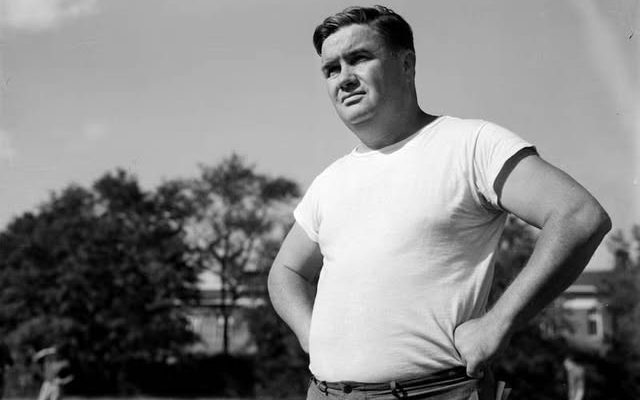**The Championship That Won’t Go Away? Why Alabama’s 1941 National Title Claim Still Sparks Debate, Decades Later — And What It Says About College Football’s Most Polarizing Dynasty**
In the pantheon of college football dynasties, few programs evoke as much reverence—or resentment—as the Alabama Crimson Tide. With more claimed national championships than any other school, Alabama’s legacy is built on a foundation of dominance, tradition, and, in some cases, disputed history. Among the most contentious of these titles is the one awarded for the 1941 season, a claim that remains a flashpoint for debate more than eight decades later. It’s a championship that, depending on who you ask, either solidifies Alabama’s place as the sport’s preeminent powerhouse or exemplifies the murkiness of retroactive title claims in an era before clear-cut systems existed.
The 1941 season was a turbulent time in college football, played against the backdrop of a world on the brink of war. Alabama, under head coach Frank Thomas, finished the regular season with an 8-2 record, including losses to Mississippi State and Vanderbilt. The Tide were invited to the Cotton Bowl, where they defeated Texas A&M 29-21, finishing the year ranked No. 20 in the Associated Press poll. Minnesota, which went 8-0 and was crowned AP national champions, was the undisputed best team in the land. Yet, years later, Alabama would add 1941 to its list of claimed titles, thanks to a retroactive selection by the Houlgate System, a mathematical formula devised by a Los Angeles-based accountant named Deke Houlgate.
The Houlgate System, one of many now-defunct ranking methods used in the early 20th century, was never an official determinant of championships during its time. It was just one of several systems—alongside the likes of the Dickinson System and the Helms Athletic Foundation—that attempted to bring order to the chaotic world of college football rankings. Unlike the AP poll, which was (and remains) the most widely recognized authority, these systems often recalculated titles years after the fact, leading to discrepancies in who could rightfully claim a championship. In Alabama’s case, the Houlgate System’s post-hoc calculations placed the Tide atop its 1941 rankings, giving the program a reason to add another line to its trophy case.
Critics argue that Alabama’s claim to the 1941 title is tenuous at best, a revisionist exercise in championship inflation. After all, the Tide weren’t just not the best team that year—they weren’t even close. Minnesota, led by legendary coach Bernie Bierman, outscored opponents 169-38 and produced two consensus All-Americans. Texas, which finished No. 2 in the AP poll, also had a stronger case than Alabama. To retroactively crown the Tide as champions, some say, is to rewrite history in a way that benefits the program’s mythology rather than reflects the reality of the season.
Defenders of the claim, however, point to the broader context of how national championships were recognized in that era. Before the BCS and College Football Playoff, before even the AP poll became the gold standard, titles were often a matter of opinion. Multiple teams could—and did—claim championships in the same year based on different selectors. Alabama isn’t alone in this practice; other blue-blood programs, including Notre Dame and Michigan, have also retroactively claimed titles based on now-obscure systems. In that sense, the 1941 title is less an outlier and more a reflection of how messy college football’s history has always been.
But the debate over 1941 isn’t just about one disputed championship—it’s about what it represents in the larger narrative of Alabama football. The program’s unmatched success has always been accompanied by skepticism from rivals who view its title claims as inflated or even manufactured. Detractors point to the fact that Alabama lists 18 national championships, while more conservative counts (such as those recognized by the NCAA) credit them with fewer. The 1941 title, in particular, has become a lightning rod for this criticism, a symbol of the program’s willingness to stretch the definition of a “national champion” to fit its own legacy.
For Alabama fans, though, the pushback is just another example of the envy and resentment that comes with being the sport’s most dominant force. The Tide’s modern-era championships under Nick Saban are unimpeachable, but even those haven’t silenced the debates over the older ones. If anything, the 1941 controversy highlights how college football’s history is inherently subjective, a patchwork of competing claims and conflicting methodologies. In a sport where mythology is often as important as reality, Alabama’s willingness to embrace every possible title—contested or not—speaks to a larger truth: in college football, legacy is about more than just what happens on the field. It’s about who gets to write the story.
So, should the 1941 title count? The answer depends on who you ask. For Alabama, it’s a part of the program’s storied history, a recognition of a season that, by at least one metric, was worthy of a championship. For skeptics, it’s a relic of a bygone era, a title that wouldn’t hold up under modern scrutiny. What’s undeniable, though, is that the debate itself reveals something deeper about college football—a sport where the past is always up for interpretation, and where the line between fact and legend is often blurred.
As long as Alabama remains at the center of the college football universe, the 1941 championship will continue to be a point of contention, a footnote that refuses to fade away. And in a way, that’s fitting. Because in a sport built on rivalry, tradition, and endless debate, perhaps the most Alabama thing of all is having a championship that—no matter how many years pass—simply won’t be forgotten.



